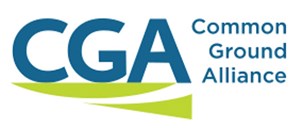Common Ground Alliance report identifies risks, opportunities for improving underground utility locating practices
(UI) – Common Ground Alliance (CGA) – the national association protecting underground utility lines, people who dig near them, and their communities – published the “DIRT Special Report: Uncovering Contributing Factors to Locating Practice Errors.”

The report examines some of the underlying factors driving damages associated with locating practices, the root cause attributed to more than a third of all underground utility damage, across three case studies:
- Google Fiber’s (GFiber) coordination with 811 centers, locators, and fiber-installation sub-contractors on large fiber and network build projects, resulting in a 39% reduction in locate-related project delays
- The Massachusetts Department of Public Utilities’ (MA DPU) proactive enforcement on non-gas facility operators that were failing to complete markouts on time, resulting in greater than 99% completion rates post-intervention
- North Carolina 811’s (NC811) analysis of the effects of ticket screening, including how many cleared and re-issued tickets were associated with DIRT-reported damages
“Three snapshots across different stakeholder groups all show the power of a consensus-based approach to reducing underground utility damage,” said CGA President and CEO Sarah Magruder Lyle. “We’re seeing a massive investment in the infrastructure that forms the foundation of our day-to-day lives. Stakeholders simply must improve coordination to protect both our communities and our investments in public utilities.”
GFiber’s work demonstrates that while billions of dollars in funding are available to expand broadband networks to reduce the digital divide, this also poses an increased risk.
Recently, GFiber experienced project delays related to locating practices. The company found several utilities were overloading the locate system with an unexpected number of large projects and the volume of locate notices was overwhelming the capacity of locate companies.
In collaboration with involved stakeholders, an end-to-end review of the process was completed for projects in 10 states and to-date, a 39% decrease in locate-related project delays has been achieved.
To examine an alternate perspective on damages associated with locating practices root causes, North Carolina 811 analyzed the impact of “ticket screening,” or clearing tickets not in conflict with utility lines to prioritize locating known conflicts.
If a ticket is cleared and an excavator finds evidence of unmarked buried utilities, they are required to put in a three-hour notice which forces locators to play catch-up and respond within the state-mandated three hours. Analysis of 811 tickets and damage data revealed that 45% of the damages associated with three-hour tickets were instances of tickets initially cleared but later marked.
North Carolina 811 Executive Director and CGA Data Committee Co-chair Louis Panzer indicates research has largely been driven by the suspicion that many locate requests are falling through the cracks. “Finding efficiencies will help improve the accuracy of screening, avoid near misses, and increase confidence in the 811 system as a whole,” said Panzer. “To achieve CGA’s goal of reducing damages by 50% over five years, it is essential to identify these damage concentrations so targeted corrective measures can be taken.”
Systemic challenges require systemic solutions – as the Massachusetts Department of Public demonstrated in working with two non-gas facility operators to improve their locating markout processes. Rather than issuing fines and seeing the same outputs, they worked with the operators to help them address the underlying issues and communicate with their third-party locators to address challenges.
Related News
From Archive

- Glenfarne Alaska LNG targets late-2026 construction start for 807-mile pipeline project
- U.S. water reuse boom to fuel $47 billion in infrastructure spending through 2035
- $2.3 billion approved to construct 236-mile Texas-to-Gulf gas pipeline
- Major water pipe break in Puerto Rico hits over 165,000 customers
- Potomac River Tunnel project enters construction phase beneath Washington, D.C.
- Pennsylvania American Water launches interactive map to identify, replace lead water service lines
- Trump's tariffs drive $33 million cost increase for Cincinnati sewer project
- Utah city launches historic $70 million tunnel project using box jacking under active rail line
- Tulsa residents warned after sewer lines damaged by boring work
- Fatal trench collapse halts sewer construction in Massachusetts; two workers hospitalized



Comments